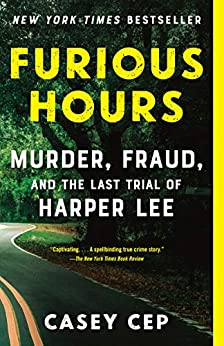More on this book
Community
Kindle Notes & Highlights
by
Casey Cep
Read between
May 2 - May 12, 2020
History isn’t what happened but what gets written down,
“My baby sister that we thought would have to be supported all her life could buy and sell us all at the drop of a hat,” Louise wrote
“It is strange, but people not in our game (The Arts, uffle wuffle) have no concept of the intense loneliness of it.”
With her first novel, she told Peck, “nobody cared when I was writing it; now it seems that my neck is being breathed on, but I refuse to let this thing go until it approaches some standard of excellence.”
Her new mockingbird was starting to seem more like an albatross, and it weighed on her more heavily the more people knew about her work: “My agent wants pure gore & autopsies, my publisher wants another best-seller, and I want a clear conscience, in that I haven’t defrauded the reader.”
If it were just a matter of getting another book out the door, after all, she could have handed over Go Set a Watchman, which was sitting in her family’s safety-deposit box at the Monroe County Bank.
See, this is why I don't think Go Set A Watchman should have been published posthumously. Obviously she didn't want it published if she had plenty of opportunities to do so!
Then Lee said something about the historian that was far more revealing than anyone in the high school auditorium might have realized: “I think Pickett left his heart at Horseshoe Bend.”
I have accumulated enough rumor, fantasy, dreams, conjecture, and outright lies for a volume the length of the Old Testament;
there is no cassette tape long enough to measure human vanity.
Lee, by contrast, was so elusive that even her mysteries have mysteries: not only what she wrote, but how; not only when she stopped, but why.
Lee’s writing voice catches like a briar; it doesn’t tear its subjects, but sticks to them.
Writer’s block is a symptom, not a disease.
But unfinishedness, like love and loss, comes in degrees.
“Self-pity is a sin,” she told a reporter in 1963, already frustrated, only three years after Mockingbird. “It is a form of living suicide.”
“Life doesn’t make us. We create our events. Nobody asked us to be born, but while we’re here we should do the best we can with what we have.”
“Fame was a four-letter word, and boredom was for rich and dull-witted Yankees.”
In a strange symmetry of author and subject, Lee and her book became the object of as much “rumor, fantasy, dreams, conjecture, and outright lies” as Maxwell had once been.


